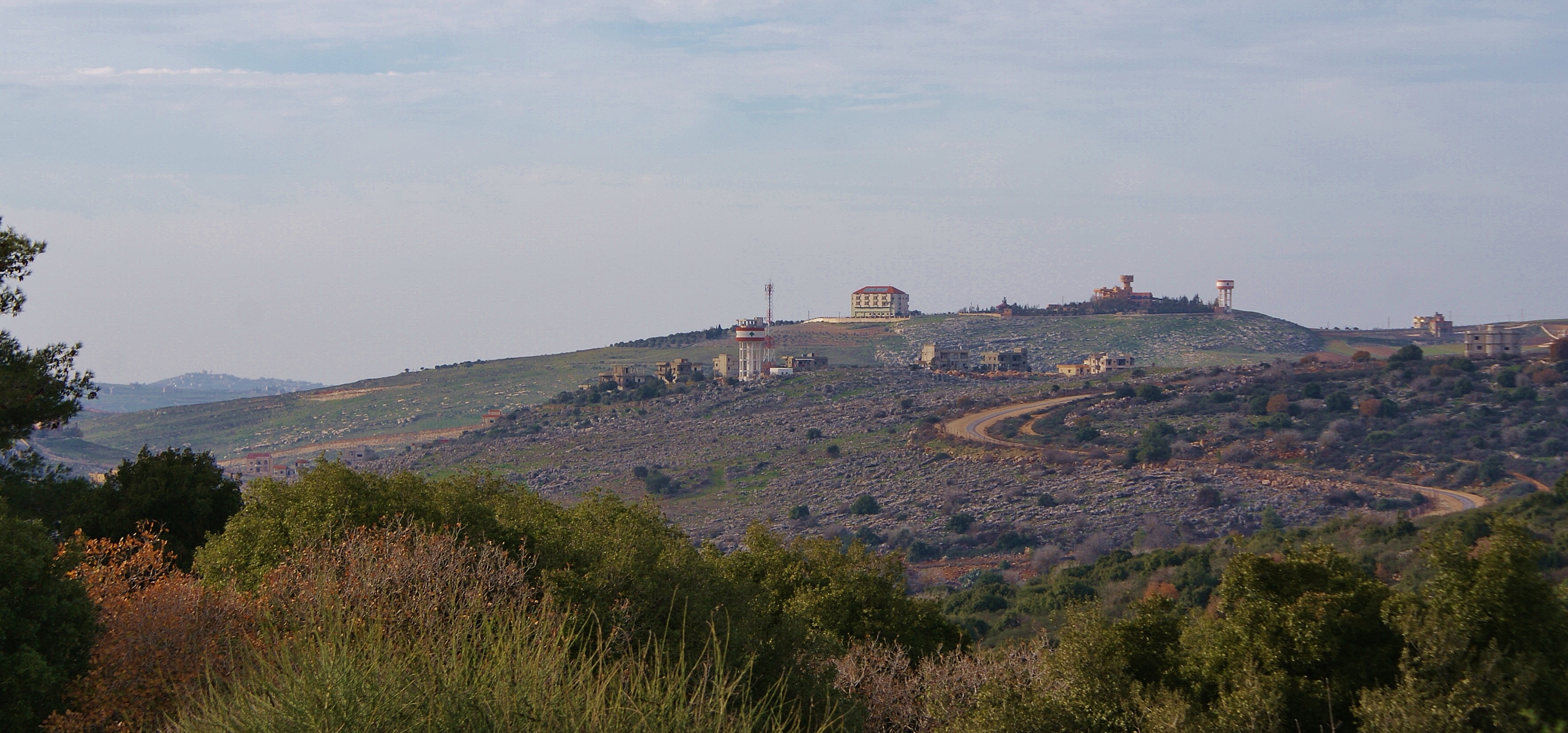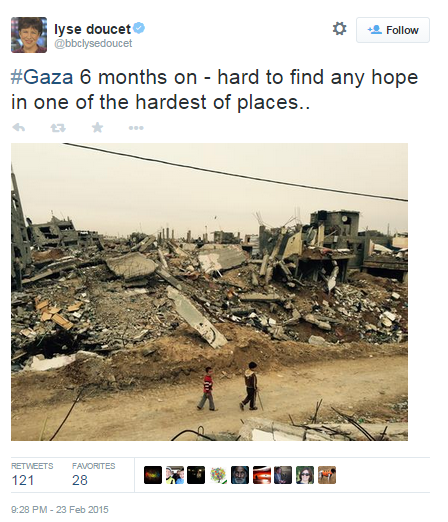A report headlined “ICC wants to open ‘war crimes’ investigation in West Bank and Gaza” was published on the BBC News website’s ‘Middle East’ page on the afternoon of December 20th.
Readers were told that:
“The International Criminal Court’s chief prosecutor says she wants to open an investigation into alleged war crimes in the Palestinian Territories.
Fatou Bensouda said “war crimes” had been or were being committed in the Israeli-occupied West Bank, East Jerusalem and Gaza Strip, and asked for a ruling on the court’s territorial jurisdiction.”
And – linking to the statement put out on the same day by the ICC:
“In her ruling, Ms Bensouda said a preliminary examination had gathered enough information to meet all criteria to open an investigation, and that she was “satisfied that there [was] a reasonable basis to proceed” with an inquiry.
“[T]here are no substantial reasons to believe that an investigation would not serve the interests of justice,” she said, adding that she had filed a request with judges to rule on what territory a future inquiry would cover because of the contested legal and factual issues of the territories.”
No further explanation was provided concerning those “contested legal and factual issues” which are the background to that request for “a jurisdictional ruling” and so readers would be ill equipped to understand the context to the Israeli reactions quoted in the report.
“Israel said the ICC move was baseless.
In a statement, Prime Minister Benjamin Netanyahu said the ICC, of which Israel is not a member, had “no jurisdiction in this case”, and that the decision had turned the Hague-based court into a “political tool to delegitimize the State of Israel”. Israel occupied the West Bank, Gaza and East Jerusalem in the 1967 Middle East war. […]
Mr Netanyahu described the announcement as an “outrageous decision”, saying: “The ICC only has jurisdiction over petitions submitted by sovereign states. But there has never been a Palestinian state.”
Earlier, Israel’s attorney general said the ICC had no jurisdiction in the West Bank or Gaza. Israel also considers East Jerusalem, which it regards as its sovereign territory, as outside the court’s mandate.”
The BBC did not bother to provide readers with a link to the statement issued on the same day by the Attorney General’s office which concludes:
“…the necessary precondition to the Court’s jurisdiction under Article 12(2) of the Rome Statute, which requires there to be a sovereign State that has delegated to the Court criminal jurisdiction over its territory and nationals, cannot be met by virtue of the simple fact that no sovereign Palestinian State is in existence. The events surrounding the purely technical act of the purported accession of “Palestine” to the Rome Statute, or the Palestinian purported Article 12(3) declaration, neither alter this conclusion nor substitute for the substantive inquiry required for the establishment of the Court’s jurisdiction. Moreover, even if a conclusion is erroneously reached that a sovereign Palestinian State exists, the scope of the territory concerned is indeterminate and is clearly not for an international criminal court to define; and if the Rome Statute is misinterpreted to allow for non-sovereign entities to confer jurisdiction upon the Court, the latter would still lack jurisdiction over Area C and Jerusalem as well as Israeli nationals.”
Readers of the original version of the BBC’s report were told that:
“Ms Bensouda did not specify the perpetrators of the alleged crimes but it is understood that in her preliminary inquiries she has been focused on issues like Israel’s building of settlements and its military operations in Gaza, BBC Middle East analyst Alan Johnston reports.”
That section was later amended to read: [emphasis added]
“Ms Bensouda did not specify the perpetrators of the alleged crimes but, if she proceeds with her investigation, charges might be filed against Israelis and Palestinians, BBC Middle East analyst Alan Johnston reports.
It is understood that she focused her preliminary inquiries, in a case the Palestinians brought under the State of Palestine, on issues like Israel’s building of settlements and its military operations in Gaza, our correspondent adds.”
The BBC did not clarify to readers that the relevant document published by the ICC also states (section 94) that:
“…there is a reasonable basis to believe that members of Hamas and Palestinian armed groups (“PAGs”) committed the war crimes of: intentionally directing attacks against civilians and civilian objects (articles 8(2)(b)(i)-(ii), or 8(2)(e)(i)); using protected persons as shields (article 8(2)(b)(xxiii)); wilfully depriving protected persons of the rights of fair and regular trial (articles 8(2)(a)(vi) or 8(2)(c)(iv)) and wilful killing (articles 8(2)(a)(i), or 8(2)(c)(i)); and torture or inhuman treatment (article 8(2)(a)(ii), or 8(2)(c)(i)) and/or outrages upon personal dignity (articles 8(2)(b)(xxi), or 8(2)(c)(ii)).”
Quoting casualty figures that the BBC has never bothered to independently verify, the report informed readers that:
“The ICC has been examining what they say are war crimes committed by Israel since June 2014, one month before a war between Israel and Palestinian militants in Gaza. In the fighting, 2,251 Palestinians, including 1,462 civilians, were killed while 67 soldiers and six civilians were killed on the Israeli side.”
Despite having previously acknowledged in 2015 that “the date chosen by the Palestinians as the starting point for the ICC to investigate requires explanation as it is clearly not arbitrary”, this report makes no effort to inform audiences why the ‘start date’ of June 13th 2014 – which deliberately excludes the abductions and murders of three Israeli civilians by members of a Hamas terror cell – was selected by the Palestinians.
The BBC’s report promotes reactions from the Palestinian Authority and a political NGO also engaged in lawfare against Israel.
“In a statement, the Palestinian Authority said: “Palestine welcomes this step as a long overdue step to move the process forward towards an investigation, after nearly five long and difficult years of preliminary examination.”
Reacting to the ICC decision, B’Tselem, an Israeli human rights group, said: “Israel’s legal acrobatics in an attempt to whitewash its crimes must not be allowed to stop international legal efforts to, at long last, hold it to account.””
It closes with promotion of the BBC’s standard but partial mantra concerning ‘international law’.
“There are some 140 Israeli settlements in the West Bank and East Jerusalem, which most of the international community consider illegal under international law. Israel disputes this, and last month the US reversed its position and declared it no longer considered the settlements invalid.”
At the bottom of the article readers are told that they “may also find interesting” an embedded video dating from August 2019 which features as one of its main interviewees the director of another political NGO – Addameer – which is linked to a Palestinian terrorist organisation.
Although the BBC acknowledged years ago that the Palestinian decision to join the ICC and pursue this suit is part of what it has described as “a new strategy to put pressure on Israel“, that information is completely absent from this latest report.
Related Articles:
Why isn’t the BBC telling its audiences all about the PA’s ‘lawfare’ strategy?
Superficial BBC News report on PA application to join ICC
BBC WS ‘Newsday’ flouts corporation’s guidance on use of term Palestine
BBC World Service or Palestinian Authority radio station?
The part of the ICC preliminary investigation story the BBC decided not to tell
BBC amends ICC Q&A following reader complaint




